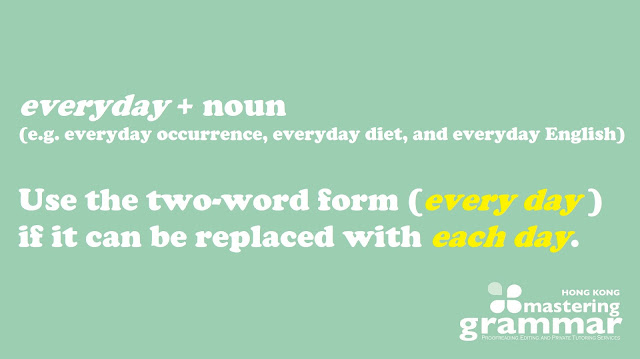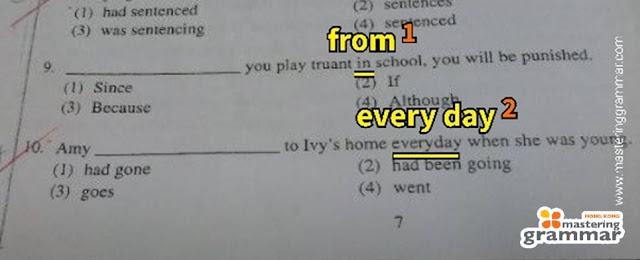Are you confused about when to use everyday and every day? This blog post will clarify the difference and help you get it right.
The Difference between Everyday and Every Day
Everyday is an adjective meaning 'commonplace' or 'ordinary'. It should be used before a noun:
✅ Most people prefer to wear everyday clothes.
✅ Computers are a part of everyday life.
✅ Everyday activities like walking and doing housework are beneficial for your health.
However, people often mistakenly use this one-word form in situations that require two words:
❌ Tom listens to music everyday.
✅ Tom listens to music every day.
❌ They go to the coffee shop everyday.
✅ They go to the coffee shop every day.
❌ I spend some time everyday reading newspapers and books.
✅ I spend some time every day reading newspapers and books.
Every day is an adverbial phrase that indicates how often an action takes place:
✅ Luke plays football every day.
✅ I go for a morning run every day to start my day off right.
✅ My brother and I talk on the phone every day, even if it's just for a few minutes.
Tips for Remembering the Difference between Everyday and Every Day
 |
| Everyday (1 word) means 'commonplace' or 'ordinary'. Every day (2 words) means 'each day'. |
I hope you have found this content helpful in your English learning journey. If so, please consider supporting this blog by buying me a coffee. Your contributions greatly help in maintaining the blog and are highly appreciated!
Examples from the Media
Shifting to a low-carbon economy will profoundly change the everyday lives of Canadians. —Toronto Star (2021)
I resolved to swim a kilometre in a local ocean pool every day. —The Sydney Morning Herald (2021)
At other restaurants [in hotels] because of rotating schedules, it can be rare to have the chef and manager working on the same day, and yet guests are paying the same price every day. —South China Morning Post (2021)
Related Posts
'Everyday' or 'Every Day'? Which One Is Correct?
Practice
In the following sentences, decide whether the given expression should be one word or two.
1. I am bored with my everyday/every day routine.
2. It is good to read everyday/every day.
3. He goes to the library everyday/every day.
4. Going to the library is his everyday/every day activity.
5. My wardrobe mainly consists of everyday/every day clothing like jeans and T-shirts.
Answer Key
1. everyday 2. every day 3. every day 4. everyday 5. everyday
Real-World Examples of Misuse
 |
| (Source: WeChat) |
 |
| 1. It is more common to use the definite article the when referring to playing a musical instrument, as evidenced by data from Google Ngram. 2. The original sentence contained a comma splice, where two independent clauses were incorrectly linked by a comma. By removing it is and the comma, and connecting the clauses more directly with because, the sentence is now both smoother and grammatically correct. 3. Everyday (one word) is an adjective meaning 'common' or 'ordinary', as in everyday activities. In contrast, every day (two words) is used to indicate something occurring each day. 4. In standard English, the adverb quickly is required to modify the verb drove. (Source: Seko 思高) (Also from the Same Series: 1) |
 |
| (Source: English Examiner for Junior Forms, Book 1A) (Also by the Same Author: 1/2/3/4/5/6) |
 |
| 1. The answer to When can be a general time expression, such as before breakfast or in the morning. However, since the answer here is Half past six, which specifies a precise time, What time is the more appropriate choice. 2. Everyday (an adjective) should be changed to every day (an adverbial phrase), which is the correct form for indicating frequency. (Source: English Examiner for Junior Forms, Book 2A) (Also by the Same Author: 1/2/3/4/5/6) |
 |
| 1. I believe that this was the intended meaning of the sentence. In other words, we don't want to do this, but we have to. 2. But is not used with although or even though. 3. Every day should be two separate words in this sentence. (Also by the Same Author: 1/2/3/4/5/6/7) |
 |
| 1. A person plays truant from school. To play truant is to stay away from school without permission. 2. The two-word form every day should be used in this sentence. |
 |
| 1. It would be much better to use the definite article twice or not at all. 2. The phrase every day is an adverbial phrase that describes the frequency of an action. When used to modify a verb, it should be written as two separate words (every day) rather than as a single word (everyday). In this sentence, the two-word form should be used to indicate that the action of Mrs Lee driving to school occurs each day. (Source: St. Paul's Convent School, Primary Section) (Also by the Same School: 1/2/3/4/5/6/7/8/9/10/11/12) |
 |
| 1. Every day should be two separate words in this sentence. 2. The indefinite article is typically omitted when referring to meals like breakfast, lunch, and dinner in this context. 3. In general, a singular countable noun (e.g. infinitive) should be preceded by a determiner such as an, the, and that. (Source: Learning through Practice—Grammar and Usage for Senior Secondary Students: Multiple Choice Questions) (Also by the Same Author: 1/2/3/4/5) |
 |
| Everyday (one word) is an adjective meaning 'common' or 'ordinary', as in everyday activities. Every day (two words) means 'each day'. The sentence needed the adverbial form, every day. (Source: Hennessy Road Government Primary School (Causeway Bay)) (Also by the Same School: 1) |
 |
| 1. It is recommended that both Birthday and Resolutions be capitalised as these are key nouns. This follows standard title case formatting in English. 2. The word then suggests a sequence but does not explicitly link an action to its intended outcome. Using so that clearly connects the action (buying the alarm clock) with the goal (avoiding tardiness). 3. Everyday (one word) is an adjective meaning 'ordinary' (e.g. an everyday occurrence). Every day (two words), the correct phrase for something that happens daily, should be used in this context. 4. The original phrasing suggests that drinking milk guarantees increased height. Scientifically, height is primarily determined by genetics. While milk can support bone health, it does not ensure growth. The revised phrasing is more accurate, acknowledging that while milk may contribute to overall health, it does not guarantee height increase. (Source: Quick Drills for English Exams (4B)) (Also from the Same Series: 1/2/3) |





















2 Comments
Very helpful thanks
ReplyDeleteI'm glad you found it helpful.
Delete